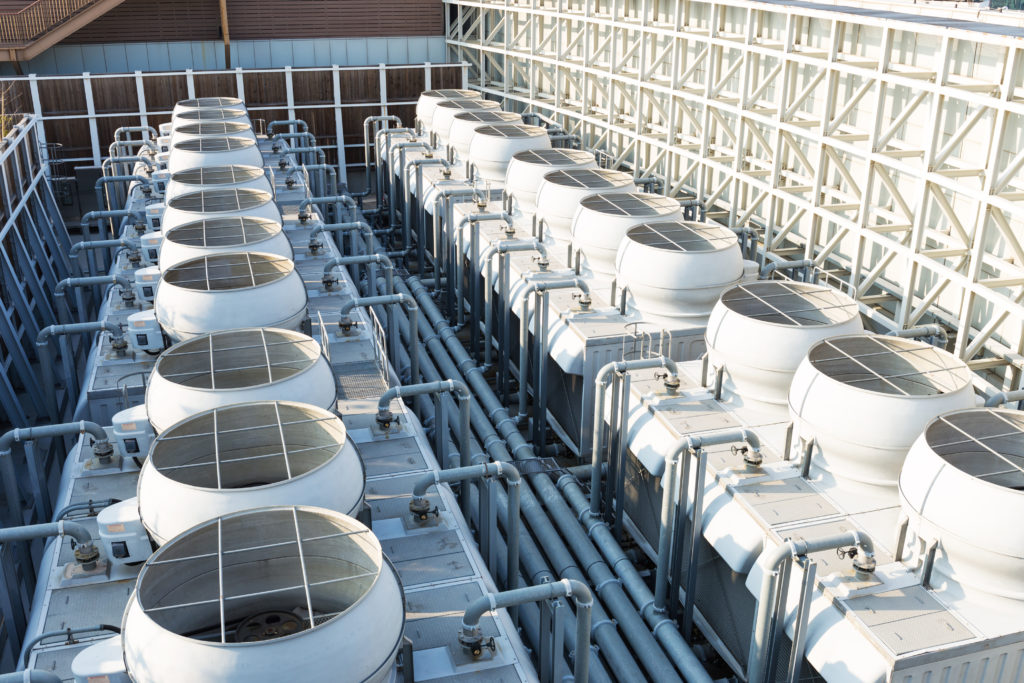How Do You Know If You Need a Cooling Tower Water Treatment System for Your Plant?
In order to keep your production flowing smoothly and avoid costly damage to your cooling tower equipment, the proper treatment of your cooling tower water is essential. If cooling tower water is not properly treated, organic growth, fouling, scaling, and corrosion can reduce plant productivity, cause plant downtime, and require costly equipment replacements down the road.
But how do you know if you need a cooling tower water treatment system for your plant? Keep in mind that treatment methods will vary depending on your specific cooling tower chemistry, makeup water needed, and whether it’s an open- or closed-loop process, but generally, if you are using a cooling tower for your process or to cool your building, chances are you’ll need some type of water treatment system. This article breaks down the various reasons below:

Alkalinity and pH levels too high or low
When it comes to regulating pH and alkalinity in your cooling tower water, the proper balance for your equipment and process is key. Since the proper balance can vary depending on your cooling tower system and the quality of your water source, it is recommended that you consult a water treatment specialist. In general, however, lower pH/alkalinity levels reduce the likelihood and amount of scaling in your cooling tower.
Controlling acid feed, softening, and pH/alkalinity is critical and should be closely monitored. Failure to do so can lead to rapid scale formation and/or corrosion to equipment.
High amount of hardness or total dissolved solids
High hardness and total dissolved solids (TDS), especially in the form of calcium carbonate, can also lead to heavy scaling. As water evaporates, removing the heat for cooling, the solids remaining concentrate. If they are not properly removed in blowdown or prevented in the first place by properly treating cooling tower water, these solids and hardness begin to build up on heat transfers and other internal piping. This can clog the system and lead to downtime or failure. In general, it’s best to ensure water and makeup water chemistry is being treated properly to avoid this issues in the first place, as once the scale is formed, it’s difficult to remove.
[Download our free cooling tower water treatment e-book.]
Microorganisms in your cooling tower water
Cooling tower water, especially in open-recirculating system, are susceptible to microbial growth. These biofilms occur when favorable conditions promote the growth of bacteria that lead to fouling, corrosion, and other system issues. The level of problematic bacteria will vary depending on your water source and the type of cooling tower you have, but in general, cooling towers can be a breeding ground for certain type of bacteria, fungi, and algae. Cooling towers can also grow harmful bacteria such as legionella, which is naturally occurring in surface water and has been known to cause people to get extremely sick and can even lead to death. It’s important to closely monitor these growths and treat them as necessary since most states have mandates for treatment and testing.
Depending on the microbiological contaminants present, certain membranes are efficient, as well as certain biodispersants and oxidizing and nonoxidizing biocides.
Insufficient water supply
In places where water supplies are scarce, it is likely local regulations will prevent you from drawing too much water from your source or releasing too much water into the environment. In this circumstance, it can be beneficial to treat your cooling tower blowdown for reuse.
Any discharge your system creates will need to meet all regulatory requirements as well. In certain areas where water is scarce, there could be large sewer connection fees, and demineralization systems can be a cost-effective solution here, as they can help minimize the cost to connect to water and sewer lines. Also, the discharge of your cooling tower bleed must meet local municipal discharge regulations if your effluent is being returned to the environment or a publicly owned treatment works (POTW).
What now?
Treating cooling tower water properly is essential to the success and efficiency of your process. Organic growth, fouling, scaling, and corrosion are all challenges that can reduce plant productivity and require costly equipment replacements down the road.
When it comes to deciding if you need treatment for your cooling tower water, it is extremely important to consult a water treatment specialist. The chemistry and required makeup water will depend on your plant’s individual needs.
If you think your facility might need a cooling tower water treatment system, feel free to reach out to SAMCO for a consultation. We have over 40 years’ experience custom-designing and manufacturing these types of systems, so please feel free to reach out to us with your questions. For more pricing information or to get in touch, contact us here to set up a call with an engineer or request a quote. We can walk you through the steps for developing the proper solution and realistic cost for your cooling tower water treatment system needs.
Some other articles about cooling tower water treatment you might be interested in include:
- What Is a Cooling Tower Water Treatment System and How Does It Work?
- How to Increase Your Industrial Cooling Tower Efficiency
- Common Cooling Tower Water Treatment Problems and How to Solve Them
- Treated vs. Untreated Cooling Tower Water: Risks for Your Plant
- Five of the Best Cooling Tower Water Treatment Equipment Supply and Technology Companies
- How Much Does a Cooling Tower Water Treatment System Cost? (Pricing, Factors, Etc.)
